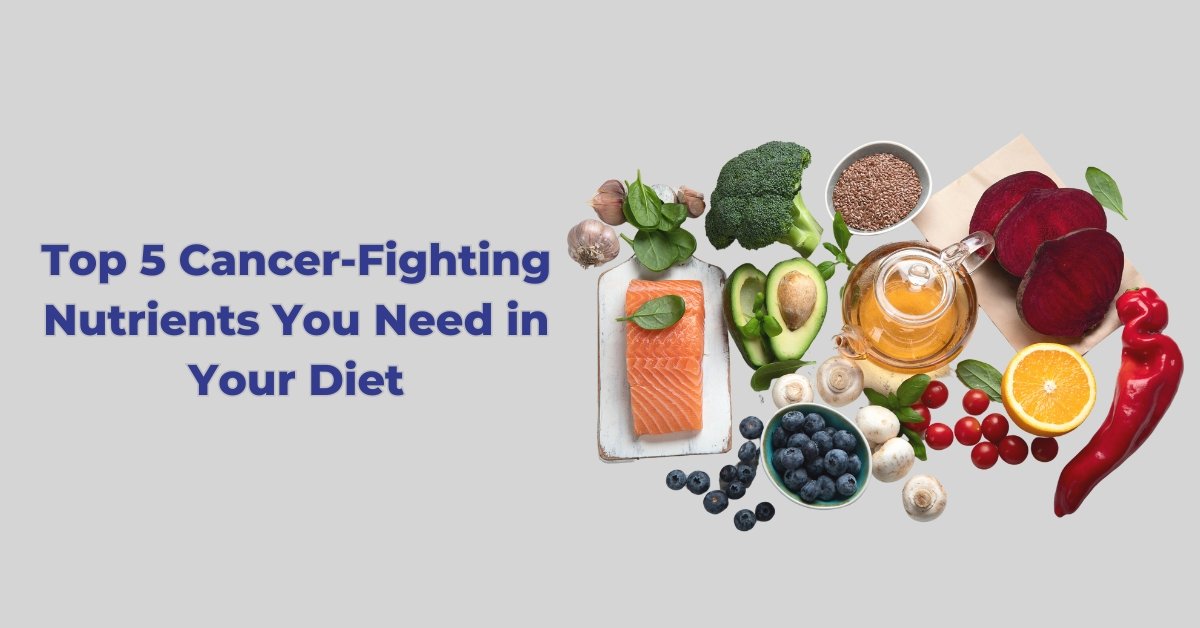
As an oncologist, I am often asked about the role of diet in cancer prevention and management. While no single food can guarantee cancer prevention, incorporating certain nutrients into your daily diet can significantly reduce your risk. Here are the top five cancer-fighting nutrients that everyone should consider including in their meals:
1. Leafy Greens -Top 5 Cancer-Fighting Nutrients
Leafy greens, such as spinach, kale, and Swiss chard, are rich in vitamins, minerals, and antioxidants. These vegetables contain carotenoids, flavonoids, and folate, all of which have been linked to a lower risk of certain cancers. For instance, studies have shown that high intake of folate can reduce the risk of breast, pancreatic, and colon cancers. Including a variety of leafy greens in your diet provides a broad spectrum of nutrients essential for maintaining overall health and reducing cancer risk.
How to Include:
- Add spinach or kale to your morning smoothie.
- Enjoy a mixed greens salad with a variety of vegetables for lunch.
- Sauté Swiss chard or collard greens as a side dish for dinner.
2. Berries
Berries, such as blueberries, strawberries, and raspberries, are packed with antioxidants like vitamin C and ellagic acid. These antioxidants help neutralize free radicals, which can damage cells and lead to cancer. The high fiber content in berries also supports digestive health, which is crucial for reducing the risk of colorectal cancer.
How to Include:
- Top your breakfast cereal or yogurt with a handful of fresh berries.
- Blend frozen berries into a refreshing smoothie.
- Snack on a bowl of mixed berries for a sweet and healthy treat.
3. Nuts and Seeds
Nuts and seeds, including almonds, walnuts, chia seeds, and flaxseeds, are excellent sources of healthy fats, fiber, and antioxidants. Omega-3 fatty acids found in walnuts and flaxseeds have anti-inflammatory properties and have been shown to reduce the risk of breast and prostate cancers. Additionally, the high fiber content aids in maintaining a healthy digestive system.
How to Include:
- Sprinkle chia or flaxseeds on your morning oatmeal.
- Snack on a handful of mixed nuts between meals.
- Add ground flaxseeds to smoothies or baked goods.
4. Cruciferous Vegetables
Cruciferous vegetables like broccoli, cauliflower, Brussels sprouts, and cabbage contain compounds called glucosinolates. When these vegetables are chopped or chewed, glucosinolates are broken down into biologically active compounds that have been shown to inhibit the growth of cancer cells and promote their elimination.
How to Include:
- Steam or roast broccoli and cauliflower as a side dish.
- Add shredded cabbage or Brussels sprouts to salads and stir-fries.
- Make a delicious coleslaw with cabbage and a light dressing.
5. Garlic and Onions
Garlic and onions are part of the allium family, which is known for its sulfur-containing compounds. These compounds have been shown to boost the immune system and have anti-cancer properties, particularly in reducing the risk of stomach, colorectal, and prostate cancers. Regular consumption of garlic and onions can also promote detoxification processes in the body.
How to Include:
- Add minced garlic and chopped onions to soups, stews, and sauces.
- Roast whole garlic cloves with vegetables or meat.
- Include raw onions in salads and sandwiches for added flavor.
Conclusion
Incorporating these cancer-fighting nutrients into your diet is a proactive step towards reducing your cancer risk and enhancing overall health. Remember, a balanced diet rich in a variety of fruits, vegetables, nuts, seeds, and whole grains, combined with a healthy lifestyle, can make a significant difference. As always, consult with your healthcare provider or a nutritionist to tailor dietary recommendations to your specific needs.
By prioritizing these nutrient-dense foods, you are not only supporting your body’s natural defenses but also taking an active role in your long-term health. Stay informed, stay healthy, and make every meal an opportunity to nourish your body and mind.
For more personalized advice and cancer-related information, feel free to schedule a consultation.Together, we can create a comprehensive plan that supports your health and well-being.
Why More Young Adults Are Developing Colorectal, Pancreatic & Other GI Cancers …
By Dr. Saadvik Raghuram Y – Leading Oncologist in Hyderabad World Cancer …
Why Are So Many Young People Getting Cancer Today? Across the world, …
January is Cervical Cancer Awareness Month in India, and this article explains …
Cancer-Related Fatigue (CRF) is one of the most common—and most underestimated—symptoms experienced …
Every year, Aplastic Anemia Awareness Month shines a spotlight on a rare …

